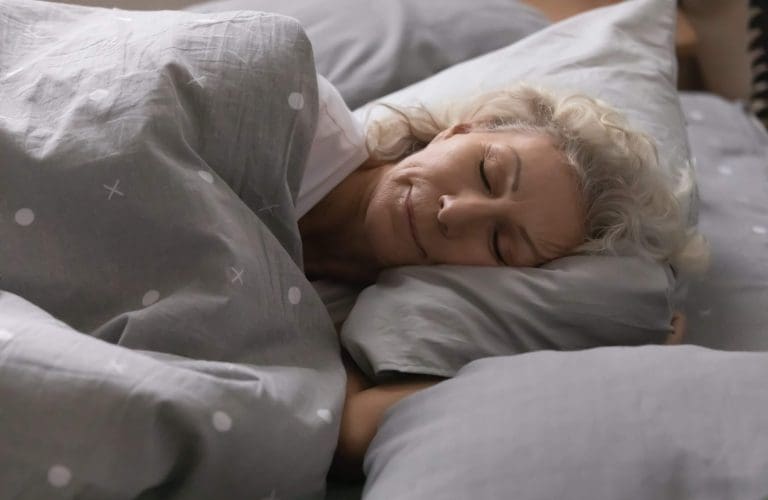Tips for Older Adults for Getting a Good Night’s Sleep

A good night’s sleep re-energizes and refreshes us, but it can also greatly impact both physical and cognitive well-being. Enhanced mental health, memory proficiency and immune function are only a few of the benefits that might be realized.
All adults need approximately 7 to 9 hours each night. Unfortunately, many older adults may find it more difficult to fall asleep or to stay asleep once they do. Research has shown that lack of quality sleep can increase the risk of diabetes, cardiovascular disease, obesity and depression.
Why Older Adults May Struggle with Sleep
According to the National Institute on Aging, there are a few common reasons why older adults find it more difficult to sleep – such as pain, illness or taking certain medications.
Other causes include sleep apnea, or short pauses in breathing while asleep, or movement disorders which can involve restless leg or periodic limb movement. These conditions may result in feeling pins and needles or jerking and kicking the legs every 20 – 40 seconds during sleep.
Insomnia is the most common sleep problem for adults aged 60 and older. The following are common indicators:
- Taking a long time to fall asleep
- Waking up many times in the night
- Waking up early and unable to return to sleep
- Waking up tired
- Feeling tired and sleepy during the day
Getting Enough Sleep? Signs to Notice
If you experience any of the following, it may be the result of not getting the amount, or quality of sleep that you need:
- Feeling irritable
- Struggling to recall information
- Waking up tired
- Experiencing increased forgetfulness
- Feeling depressed
- Falling more
Download our complimentary guide Choosing the Right Senior Living Community: A Step by Step Guide for Making an Informed Decision.
Tips for Older Adults to Get a Good Night’s Sleep
The good news is that there are many steps you can take to improve your sleep. Consider these suggestions:
1. Follow a regular sleep schedule
Creating and maintaining a sleep schedule can improve your ability to achieve quality rest. Go to sleep and wake up at the same time each day – even on weekends.
2. Avoid napping late in the day
Sleeping later in the day can make falling asleep that night more of a challenge. If you need to nap, try to rest in the late morning or early afternoon. Also, keep your naps as short as possible.
3. Develop a bedtime routine
The customs that you create will eventually cue your body and mind that it is time for sleep. Discover what works best for you – taking a warm bath, reading a book or listening to soothing music are a few ideas.
4. Avoid watching television or using electronic devices in the bedroom
Although many people crawl into bed and open their laptops, watch television or check their phones, the light from these devices can make it more difficult to fall asleep. Watching unsettling movies can also keep you awake.
5. Keep your bedroom comfortable
Create an area that invites you to relax and rest. Regulate the temperature so you are not too warm or cool and ensure that you are able to achieve quiet and relief from noise.
6. Use low lighting in the evening
Pay attention to the lighting levels as night falls. You’ll want to ensure you have enough illumination for safety but begin dimming lights in the bedroom as you get ready for bed.
7. Avoid exercising close to bedtime
While you’ll want to exercise daily to meet your wellness goals, just make sure it’s not within three hours of your bedtime. Concentrate on unwinding and avoid strenuous activities.
8. Sidestep caffeine or eating a large meal before bed
Whenever possible, it’s better to eat your larger meal earlier in the day as the digestive process can interfere with sleep. Avoiding caffeine which is found in coffee, tea, soda and chocolate is also helpful.
9. Calm your mind and relax your body
Reliving a stressful day isn’t a good recipe for achieving a restful sleep. Distracting your mind by counting sheep or other tricks actually can work. Use relaxation techniques to quiet your body.
Source: National Institute on Aging
When to Talk to Your Doctor
If you continue to struggle with sleep disruption, always feel tired during the day or experience a decline in your quality of life due to an inability to get the rest you need, it’s time to talk to your doctor.
There may be medication that can treat restless leg or limb movement syndromes, as well as exercises and specific relaxation practices that might help. CPAP or Continuous Positive Airway Pressure devices can help those with sleep apnea.
It’s important to respect the power of sleep. If getting a good night’s slumber is proving illusive, reach out for help. Your body and mind will appreciate the effort.
Discover life at a Northbridge community.
If you’re considering senior living for yourself or a family member, we hope you’ll visit one of our communities. You’ll find a maintenance-free, activity-filled and engaging lifestyle to help support your wellness goals.
You’ll also discover many benefits in a Northbridge Senior Living community, including our Signature Program S.T.A.R. Club (Sharp Thinking, Active Residents) – which offers our residents several activities to participate in with others, including:
- Daily exercise group
- Walking club
- Tai Chi & yoga
- Nutritional classes
- Library and book club
- Museum outings
- Artists in residence program
- Multi-generational music
- Genealogy Generations
We’re here to answer any of your questions and invite you to download our complimentary guide Choosing the Right Senior Living Community: A Step by Step Guide for Making an Informed Decision. Please contact us if we can provide further information or if you would like to schedule a personalized tour.
